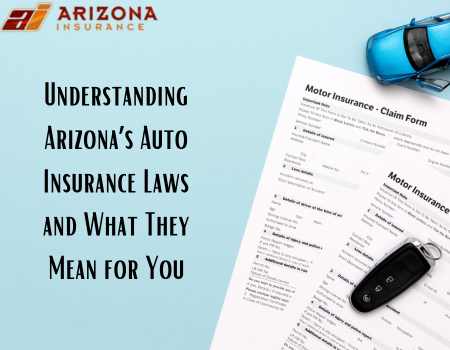In Arizona, auto insurance is not only essential for protecting your vehicle and finances but is also required by law. Understanding the state’s auto insurance laws can help ensure you’re fully covered and avoid penalties. Whether you’re a new driver or a seasoned one, it’s important to know what Arizona’s auto insurance laws mean for you and your responsibilities as a driver.
 1. Arizona’s Minimum Auto Insurance Requirements
1. Arizona’s Minimum Auto Insurance Requirements
Arizona law mandates that all drivers must carry a minimum level of auto insurance, often referred to as liability insurance. This coverage is designed to pay for injuries or damage caused to others in an accident where you are at fault. The required minimum coverage limits are as follows:
- $25,000 for bodily injury liability per person
- $50,000 for bodily injury liability per accident
- $15,000 for property damage liability per accident
These minimums are intended to cover the costs of medical expenses, lost wages, and property damage caused to other parties in an accident. However, this is just the baseline coverage, and many drivers choose to purchase additional coverage for greater protection.
2. Understanding Liability Insurance
Liability insurance is divided into two main components:
- Bodily Injury Liability (BI): This covers the medical costs for people who are injured in an accident you caused. It includes medical bills, pain and suffering, and any legal fees if you are sued for the injury
- Property Damage Liability (PD): This covers the cost of repairing or replacing property damaged in an accident you cause, such as another person’s vehicle or public property like fences, street signs, or buildings.
While the state’s minimum required coverage may be enough to satisfy legal obligations, it often doesn’t cover the full costs in a serious accident. Many experts recommend carrying higher limits to protect your assets in case of a lawsuit or costly damages.
3. Optional Insurance Coverage
In addition to the required liability insurance, Arizona drivers have the option to purchase additional coverage to provide more comprehensive protection:
- Collision Coverage: This covers the cost of repairing your own vehicle in the event of an accident, regardless of fault. If your car is financed or leased, this coverage is often required by the lender.
- Comprehensive Coverage: This protects your vehicle against non-collision-related incidents such as theft, vandalism, natural disasters, or hitting an animal.
- Uninsured/Underinsured Motorist Coverage: This is designed to protect you if you’re in an accident with a driver who either doesn’t have insurance or doesn’t have enough coverage to pay for your damages and injuries.
- Personal Injury Protection (PIP): While not required in Arizona, PIP is an optional coverage that helps pay for medical expenses, lost wages, and funeral costs if you’re injured in an accident, regardless of fault.
4. Proof of Insurance and Penalties
In Arizona, all drivers are required to carry proof of insurance when operating a vehicle. If you’re pulled over by law enforcement or involved in an accident, you must be able to provide proof of insurance. If you’re caught driving without insurance, you can face severe consequences, including:
- Fines of up to $500 for a first offense.
- License suspension.
- Vehicle impoundment.
Additionally, if you’re involved in an accident without insurance, you could be held financially responsible for the damages, which could result in significant out-of-pocket costs.
5. SR-22 Insurance for High-Risk Drivers
If you’ve had your license suspended due to a DUI or other serious violation, you may be required to obtain an SR-22 form. An SR-22 is not an insurance policy but a certificate issued by your insurance company that proves you carry the minimum required liability insurance. SR-22 insurance can be expensive and may require you to maintain coverage for a certain period, usually three years.
6. The Importance of Regular Auto Insurance Reviews
It’s essential to review your auto insurance coverage periodically, especially if your circumstances change. If you buy a new car, move to a new location, or start a family, your insurance needs may evolve. Regularly assessing your coverage ensures you’re adequately protected and helps avoid unexpected gaps in coverage.
Understanding Arizona’s auto insurance laws is crucial for all drivers. By ensuring you meet the state’s minimum requirements, considering additional coverage, and staying informed about your responsibilities, you can protect yourself and others on the road. Regularly reviewing your insurance policy and adjusting your coverage as needed will help ensure that you have the right protection at all times, avoiding legal trouble and financial loss.
